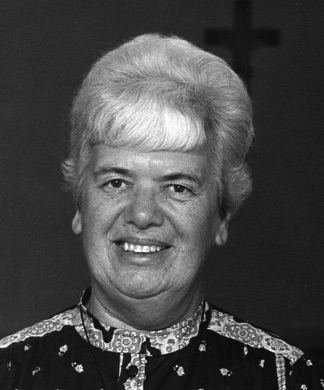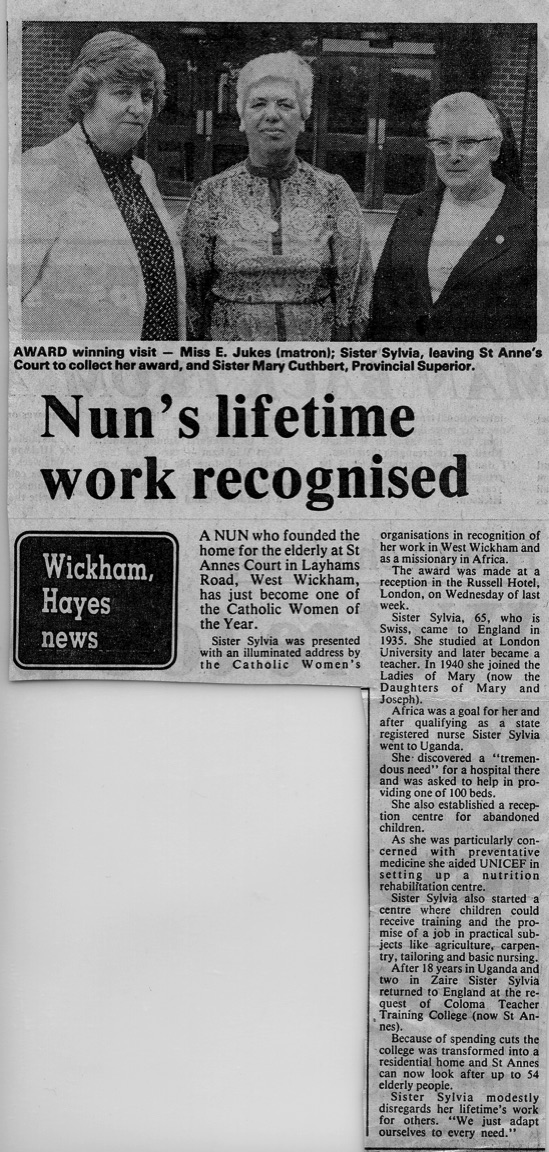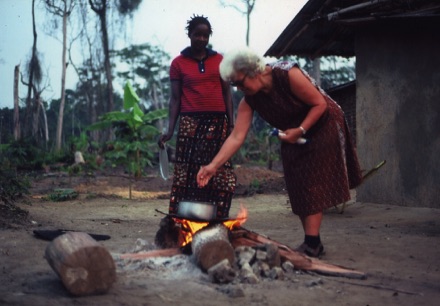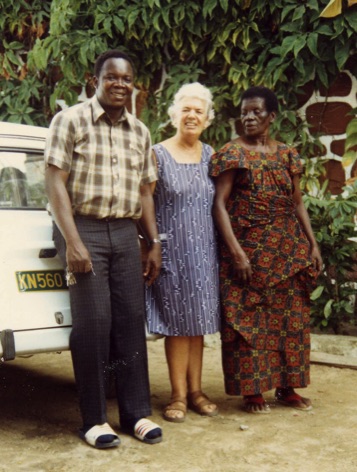Sylvia, a Unique Person! (by Abbé Nyeme Tese)
At the end of 1977 Sr. Sylvia Probst joined us in Zaïre. She was then 60 years old, a woman of manifold experiences. Her self-confidence and her perfect command of several languages were the result of her upbringing in the Swiss town of Basel, which is situated on the border with Germany and France. Sylvie came to Yanga through the providential help of the Sisters of Mercy of Ingenbohl. She was convinced that she would not remain for longer than one year. Yet history blessed us with her incomparable commitment until 1989. During these eleven years she gave a living example of witnessing the Good News of Salvation by serving the Sankuru region in an integral and lasting way. In this time she developed the Cooperative of Yanga (in short COYA) into the organisation it is today.
Sylvie was a person of deep faith in God in whose name she worked day after day with exceptional zeal. She was proud to be up from five in the morning until about midnight without ever having a nap, though she liked to say, „Never say never!“
What is it that the personality of this sister has achieved among us in Yanga?
As a religious woman experienced in matters of holistic development on African soil, Sylvie gave a new impetus and decisive direction to our agricultural and animal-rearing efforts. Since the foundation of the agricultural project "Give us today our daily bread" in 1976 these two areas had been given priority. With all her strength she tried to motivate and help people to grow plantations of coffee, rice, palm trees and fruit trees, maize, soya, pineapples, sugar cane and manioc. Never before had the COYA been focussed on agriculture to such an extent, nor had the cooperative provided the surrounding villages with as many products as in that time.
Furthermore, future generations in Yanga will remember her as a great builder. This woman did an incredible amount of construction work in Uganda, in Zaïre and later in England. COYA owes so much to her, for example the well-built houses in Yanga, in the port of Samangua, in Bena Dibele, Lodja and Kinshasa. Sylvie was peerless in her ability to organise construction. She had a way of sharing and coordinating the work which is still used by COYA even today. Everything was planned and carried out in terms of contracts: foundations, walls, roofs, doors and windows, painting and furnishing. This led to quick and excellent results. Her skill, efficiency and speed are remembered by the workers even now and they consider them to be fundamental values.
Sylvie was very sensitive to the joys and pains of human existence. As such she did a lot of social work with the constant support of friends and aid organizations from Switzerland, Germany and England. In consequence our nursery, primary and secondary schools were able to be built, followed by the health centre with a dispensary carrying her name, a maternity section, a pharmacy and a laboratory.
In addition, she developed two new transport initiatives; one on water and one by air. She bought our first boat, the M/B Samangua. Later on, two more boats and three barges were acquired. Until her death she continued to try to obtain a small aeroplane for COYA. Thanks to the financial help of her friends in the USA and her native town Basel, we were able to purchase such a precious machine after her death. The plane was used to provide a rapid response humanitarian service. All this became the property of a population who had always been secluded. God alone knows what a blessing these two innovations became for the development of this remote rural area.
We can never emphasize enough how far-sighted and generous Sylvie was. We cannot enumerate all her achievements here. She used to have frequent visits from villagers and regularly visited the villages herself. Importance was given to the proclamation of the Gospel as well as to the purchase of new types of seeds. Small village shops had to be provided with goods from the centre in Yanga, medical supplies and school equipment had to be restocked, and of course roads, bridges, chapels and schools had to be maintained.
Together with the other Swiss partners who were present in Yanga she daily supervised the running of the saw-mill, the mill and the other general sections of the cooperative.
All of us have learnt a lot from this gifted woman. Her outstanding service to the people of Yanga means that we cannot allow COYA to retreat into mediocrity.
We must admit, indeed, that no area concerning the development of Africans was left untouched by this religious woman whose heart was filled with love for Christ and our beloved Continent. May she find worthy followers on this African soil which she has loved so dearly!
Written in Yanga on March 24th, 2005
Abbé Nyeme Tese
Diocesan Director of the Cooperative of Yanga

Sr. Sylvie Probst (1917 - 1990)
This homage wants to bear witness to a life that is a model for present and future generations in our Sankuru area, in Uganda, Burundi, Switzerland and England where Sylvie lived and worked. Our wounded world will badly need this example for a long time yet.
Curriculum vitae of Sister Sylvia Probst
Silvia Probst was born on March 1, 1917. She was the youngest of four children born to her parents Probst-Steiner. Her birth place was Basel, Switzerland. There she received her primary and secondary education, followed by a two year course at the Institute Theresianum in Ingenbohl, Switzerland. In 1937 she joined the Congregation of the Ladies of Mary in England. She completed her Novitiate in Brussels and returned to England the very week of the invasion of Belgium in 1940. She made her profession in England and started her teaching career there as a language teacher under difficult conditions during World War II. She continued her studies at the same time and received her B.A. (Bachelor of Arts) degree in 1948 at the University of London. She taught in England until 1952.
Although she always enjoyed teaching she also had another goal – Africa. In 1952 she eventually got permission to go to Burundi where she taught at the Teacher-Training College in Busiga. There she realised the importance of nursing qualifications and returned to England in 1955 to follow training courses in London in nursing and received her S.R.N. (State Registered Nurse) certificate in 1958 and her S.C.M. (State Certified Midwife) certificate in 1959.
Armed with her new credentials she went back to Africa that same year – this time to Uganda. First she worked as a nurse, then she taught health education at Kinyamasika Teacher-Training College in Fort Portal. Together with her students she organised child welfare clinics, mothers' clubs, and small clinics in rural areas.
At the request of Mgr. Asta, Pro-Nuncio of Iran, she left Africa in 1965 to evaluate health needs in Tehran with a view to establishing a Christian Hospital with the Knights of Malta as project holder. The project failed because the pledged sums were not honoured.
In 1966 Sister Silvia was invited back to Africa again by Rev. Bishop J. Ogez of Mbarara to supervise the building of a hospital financed by Misereor. Her new working place was the remote village of Ibanda. There she started a baby orphanage and a maternity ward. In 1970 her greatest work, Ibanda Hospital with 100 beds, was commissioned by Misereor.
Shortly afterwards she was called to Kampala and became the Executive Secretary of the Uganda Catholic Medical Bureau. For three years she was the liaison officer between the 72 medical units in the country and the Ministry of Health. In recognition of her dedication for the Ugandan health system she was granted the Freedom of Uganda in 1973. She wanted to return to Ibanda in order to be closer to her people. She started fundraising to construct a reception centre for motherless and abandoned babies, which she opened in 1975. At the same time she started a pilot scheme in conjuction with UNICEF for the training of „nutrition scouts“ and a model farm in Bisheshe near Ibanda. It was her dream that this farm would supply food to her schools and health centres in the following years.
Sister Silvia initiated and supervised the training of students in first aid, nutrition, agriculture, animal husbandry, tailoring and carpentry. This led to the future employment of those students in many worthwhile occupations.
All these institutions at Ibanda are now in the capable hands of African administrators with the Daughters of Mary and Joseph working alongside.
In 1977 the dictatorship of Idi Amin was becoming ever more brutal and foreigners were not safe any more, so Sr. Silvia had to leave the country as well. In England a new mission was waiting for her. Because of changing education policies, Coloma College of Education in West Wickham, run by the Daughters of Mary and Joseph, was closed. Sr. Silvia soon recognized the unique opportunity this provided to make use of the buildings for much needed residential care facilities. She worked out a project to change two student hostels into a home for elderly, which she named St. Anne's.
While this reconstruction work was going on, Sr. Silvia was by no means inactive. She frequently travelled to Switzerland where she made efforts to obtain funds for her African projects from aid organisations. On such occasions she usually visited the Sisters of Mercy of the Holy Cross in Ingenbohl where her own sister was teaching. There she made the acquaintance of the Congolese priest, Fr. Jean-Adalbert Nyeme Tese, a friend of the Congregation.
Sr. Silvia was a woman for Africa and since retruning to Uganda was not possible for the time being, she had the idea of going to Zaïre. On the request of the General Administration of the Sisters of Ingenbohl Sr. Silvia got permission from her Congregation to help in building up the Cooperative of Yanga in the remote and very poor district of Kasayi Oriental in former Zaïre.
When Sister Silvia arrived in Yanga in January 1978, the people there were starving. She immediately bought 10 tons of rice and relieved the greatest suffering. Then she started her development activities: building houses, offices, stores, shops, roads and wooden bridges. Her work in Yanga bears fruit even today.
Sister Silvia went back to England in 1980, where she was asked to run the now completed home for the elderly at St. Anne's Court, the idea she had conceived a few years before. Until her death in 1990 she lived and worked in this residential home - St. Anne's Court in West Wickham near London. Now and then she took longer trips abroad to both Zaïre and Uganda to see how her projects there were doing.
In recognition of her commendable work in England and Africa she was named Catholic Woman of the Year in 1982. On this occasion a journalist asked her what was the purpose of her life. She replied: „I have only fulfilled a need where a need arose and somehow one project simply led to another.“
On February 22, 1990, after long months of patient suffering, Sister Silvia died in St. Christopher's Hospice in London where she was attended during her last days by her faithful and grateful friend from Zaïre, Father Jean-Adalbert Nyeme Tese.
The following parts of letters written by Sister Silvia to friends in Europe may serve to give an impression of her untiring work day by day during her time in Africa:
Yanga, 14th January 1978
My dear Sisters in England, Uganda, California,
You may be wondering what I am doing in distant Zaïre and how I settled down. It is real pioneer work and hard going, but a great challenge. Once you realize that there is a need, and that you can make a contribution to answer such a need, you do not mind the effort and the hardship.
The flight from Kinshasa to Lodja takes 2 1/2 hours in a small plane with less than 30 passengers. We were fortunate to have a clear day; how fortunate I only realised when we were about to land on a mudstrip with just a balloon indicating the direction of the wind and two mudhuts with grass roofs as „airport buildings“. There is no communication between the pilot and the landcrew. The pilot has to find his own direction and recognise the landmark.
The headquaters of that cooperative group is 2 km from the actual village. In 1976 Mr. Notter from Merenschwand/AG (Switzerland) sacrified his holidays and physically built a bridge with the natives to cross the little river which separates the headquaters from the village. On top of the hill they constructed a few huts made of local material, one of which is the house I am now occupying. I am the only European here. The first four days Abbé Nyeme and his nephew were with me. This was a great help. I was most impressed to see this professor of theology go down with a group of men to dig the three ponds to start a fishery scheme. They came back hungry, dirty and thirsty, but very happy to have achieved this in three days.
There is a lot to do and I am very glad to have this opportunity of leading a very simple missionary life without much comfort. In place of a bed they constructed a kind of bunker, made of sticks and branches of plamtrees. On this I have quite a thick foam mattress, but I can still feel the reeds through it.
I do the cooking on three stones in the open air behind the house. Apart from a big and a small table and a few chairs in the house there is no furniture whatsoever. After work the villagers come for treatment. Every other woman seems to be pregnant and they have started to come for antenatal care. In my bedroom I put a few strings across to hang up my belongings. I ordered a cupboard and - believe it or not - a refrigerator which will be operated with paraffin. When will it arrive? Afer I leave, perhaps. But I am thinking of making the place a bit more habitable for my possible successors. Brother Joseph of the Passionists is also arranging a kind of stove for us at Yanga on which we shall continue to cook with wood. It will be a bit better than three stones on the ground. Next to the petrol drums from which we scoop out the water I have a „table“ made of reeds on which we can dry the plates, saucepans, etc. in the sun. Every week there is some improvement.
Yanga, 25th February 1978
Two days ago I received my first luxury: a water filter! The refrigerator which I puchased (in Kinshasa) at the end of December could not be sent to Lodja because those planes are too small...
As the people are very poor in religious knowledge and conviction we are now stressing „catéchèse familiale“ and we follow a very simple course for mothers. No priest ever came to YANGA before Abbé Nyeme started this project, there is no catechist.
Kinshasa, 4th July 1978
Now we are busy purchasing fuel and building material (in Kinshasa) to fill a 200 ton „barge“, a boat which is moved by a push-boat. We managed to get 65 tons of cement for the Diocese and for ourselves. I literally spent one week getting petrol, diesel and paraffin.
We are now tearing around the city purchasing the goods and tomorrow we can start loading the „barge“ which will take the goods as far as Bena Dibele, 350 km from Yanga, taking about 14 days or more. At present it is the dry season and there are fears that the river might be too shallow in parts. On the 8th or 10th (July) we shall venture the 8 day trip by lorry to Yanga. It may be advisable that I accompany the lorry because it will be easier for me to get through the many military barriers than for the simple African drivers.
Yanga, 25th April 1979
I can no longer boast of simple mission life in a mud hut. I recently moved into the new house made of permanent material. A Swiss organisation also gave us SFr. 84'000 for the installation of a saw mill. This will be installed in June, and wer are expecting all the machinery for a carpentry workshop. We are surrounded by tropical forests and so will then be able to make our own boards etc. As you see, things are moving, thanks to my appeals and personal contacts. The Lord has been very good to us. Our coffee plantation is growing. During the past year we planted 1,472 coffee trees, and I have a team of five men to continue preparing the soil for many more trees. This will be a good source of income in the more distant future. We can expect our first crops in 1981.
One major improvement: we now have a radio call apparatus in Yanga which connects us with about 10 mission stations as far as Kananga 600 km distant. We can also communicate with Kinshasa, but only indirectly as our apparatus is not sufficiently powerful. On Saturday mornings Abbé Nyeme contacts us between 9 - 10 a.m. via Kananga. We speak with the Father in Kananga, he transmits our message to Kinshasa and give us the reply. We can also follow our lorry to and from Bena Dibele. The driver calls at each mission and tells us when he arrived and when he will leave.
Nairobi, 17th December 1986
In Zaïre life was very hectic. Our small boat „Samangua“ which pushes a „barge“ with up to 110 tons, up the river Zaïre, then rivers Kasayi and Sankuru, ventured the journey up the narrower river Lubefu meandering through tropical forests to within 30 km of our project. To reach that spot we had to remake a bridge over the river Lutshu and repair a road with ravines higher than myself, and open about 10 miles of dense forest. While our people from Yanga were busy with this I proceeded to the river Sankuru, namely the harbour „town“ BENA DIBELE, (two days journey in a Jeep via Lodja on the most terrible roads) to supervise the unloading of the goods of our many clients.
One of the main reasons for bringing Abbé Nyeme to Bena Dibele was the fact that the previous week while supervising the unloading of the barge, I had found an interesting piece of land near the river. There were two buildings in permanent material (cement blocks) and large, half-finished depots as far as the „linteau“. I was determined that we should buy this, and Abbé Nyeme agreed with me that it was a most suitable place. Until now we depended on the mission 3 km away to store our goods. We negotiated with the owner and made a contract that we would pay Z 650,000 (12,000 CHF) by the end of December. They allowed our agent in Bena Dibele to move into one building that very day and agreed that we could finish the (depots) stores. As usual I had confidence in Divine Providence that the money will be forthcoming by the end of December.
Since September I had been trying to sell my car but in vain. I was to make my last attempt a week before leaving Zaïre. It was again providential that I came to Kinshasa a week earlier and found a buyer who paid cash. In fact, I made a profit of SFr. 513 although I had travelled about 7,500 km in Europe and Kinshasa. We sent the money to Bena Dibele to finalise the deal of the land. We even had more than we needed. The land itself is 64 m x 46 m approx.
London, 22th February 1990
Abbé Nyeme describes the last hours of Sr. Sylvia in
„St. Christopher's Hospice“ in London.



To the right:
Abbé Nyeme, Sr. Sylvia et Mama Akatshi (Mother of Abbé Nyeme) 1988 in Kinshasa
The Srs. Kathleen, Mary Peter and Margaret left the room to return to their convent. I stayed alone with her.
Sr. Silva was very much in pain especially from her waist to her feet. She asked me to raise her up and to rinse her bloody mouth with soda water. Then she asked me to lay her down and to put her head gently on the pillow. She thanked me. She was grateful for the merest service: cleaning her nose or handing her an ice cube.
She followed the prayers I was reciting and I asked her from time to time if she could hear me and she nodded.
Later, Sr. Bridie arrived. She is a nurse and had spent many years with Sr. Silvia in Burundi. After a period of silence we began to talk and I told Sr. Bridie what the nurse had said about death being imminent. Shortly afterwards Sr. Bridie asked me if I could bear to be present when she died. I answered yes, because I had made the whole journey from Africa to London to be with her when she died, and now, when her time had come, I wanted to live this moment of grace.
Then I sang together with Sr. Bridie: „Maranatha, Maranatha, Maranatha, Lord Jesus!“ as the refrain of a prayer of supplication.
During this prayer Sr. Silvia's respiration changed rapidly. Her breath became slower and intermittent. Her eyes had already been closed for a while. Now also her lips closed though she hadn't been able to breathe through her nose for about three hours.
Sr. Bridie went to call a nurse and I was left alone for a moment with Sr. Silvia: O Lord, call your servant to you. She did everything for you unconditionally, yes, call her.
In this way Sr. Silvia passed, very religiously, in a climate of faith and Christian hope, on 22 February 1990 at 9.20 p.m. after having served God and her neighbour with determination and doggedness. The Lord gave her the grace to live her final days in ever more intensive prayer and meditation. She died in a truly Christian and holy way.
